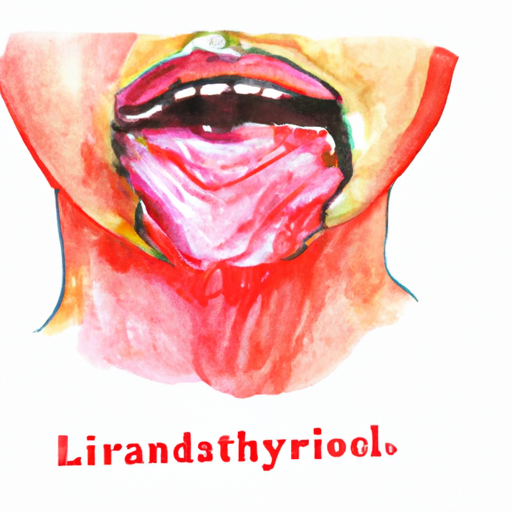Laryngitis is a common condition that affects the larynx, causing inflammation and irritation of the vocal cords. It can result in hoarseness, loss of voice, and discomfort while speaking or swallowing. Understanding the causes, symptoms, and diagnosis of laryngitis is crucial in order to effectively treat and prevent this condition. In this article, we will delve into the various aspects of laryngitis, including its causes, symptoms, and diagnosis. We will also explore the different treatment options available, ranging from medical interventions to natural home remedies. Lastly, we will provide valuable tips for maintaining a healthy larynx and preventing future episodes of laryngitis. Whether you are a professional singer, public speaker, or simply someone looking to regain your voice, this article will serve as a comprehensive guide to understanding, treating, and preventing laryngitis.
1. Understanding Laryngitis: Causes, Symptoms, and Diagnosis
Laryngitis is a condition that affects the larynx, a vital organ in our respiratory system responsible for producing sound. This condition is characterized by the inflammation or irritation of the vocal cords, resulting in a hoarse or weak voice. It can occur suddenly and last for a short period, known as acute laryngitis, or persist for weeks or even months, referred to as chronic laryngitis.
There are several factors that can contribute to the development of laryngitis. The most common cause is an infection, usually viral, such as the common cold or flu. Bacterial infections can also lead to laryngitis, although they are less common. Other causes include excessive voice use or strain, exposure to irritants like cigarette smoke or allergens, acid reflux, and certain medical conditions like asthma or allergies.
The symptoms of laryngitis can vary from person to person but typically include a sore throat, hoarse or weak voice, difficulty speaking or swallowing, dry cough, and a sensation of a lump in the throat. In some cases, individuals may experience a complete loss of voice. These symptoms can be uncomfortable and may significantly impact daily activities and communication.
Diagnosing laryngitis involves a combination of medical history assessment, physical examination, and sometimes additional tests. A healthcare professional will inquire about the patient’s symptoms, their duration, and any potential triggers. During the physical examination, the doctor will inspect the throat, looking for signs of inflammation or redness. In some cases, a laryngoscope may be used, which is a thin tube with a small camera that allows for a closer examination of the vocal cords. This procedure is typically performed by an otolaryngologist, also known as an ear, nose, and throat (ENT) specialist.
Treatment for laryngitis primarily focuses on addressing the underlying cause and relieving symptoms. In cases of viral laryngitis, rest, hydration, and over-the-counter pain relievers can help manage the discomfort. It is crucial to avoid excessive voice use and irritants to allow the vocal cords to heal. If laryngitis is caused by a bacterial infection, antibiotics may be prescribed. In chronic laryngitis cases, treatment may require lifestyle modifications, such as voice therapy, avoiding triggers, and managing underlying conditions like acid reflux.
In addition to medical interventions, there are self-care measures that can aid in the recovery process. These include staying hydrated, using a humidifier to moisten the air, avoiding throat irritants like smoking or yelling, and practicing vocal hygiene by speaking softly and avoiding excessive shouting or whispering
2. Treating Laryngitis: Effective Treatment Options and Home Remedies
Treating Laryngitis: Effective Treatment Options and Home Remedies
Laryngitis is a condition characterized by inflammation of the larynx, the voice box. It often results in hoarseness or complete loss of voice, making it difficult for individuals to speak or sing. While laryngitis can be caused by a variety of factors such as viral or bacterial infections, vocal strain, or acid reflux, the good news is that it is usually a temporary condition and can be effectively treated with proper care and management.
When it comes to treating laryngitis, there are various options available depending on the severity and underlying cause of the condition. In most cases, rest and voice therapy are the key components of treatment. It is crucial to give your vocal cords a break and avoid activities that strain them further, such as shouting or whispering. Speaking in a soft, natural tone and using amplification devices when necessary can also help reduce strain on the larynx.
For cases caused by infections, especially viral ones, the use of antibiotics is not effective as they target bacteria, not viruses. Resting the voice and providing supportive care, such as increased fluid intake and humidification of the air, can aid in symptom relief. Over-the-counter pain relievers like acetaminophen or throat lozenges may also help alleviate discomfort.
In cases where laryngitis is caused by acid reflux, lifestyle changes such as avoiding acidic or spicy foods, quitting smoking, and reducing alcohol consumption can be beneficial. Elevating the head while sleeping and eating smaller, more frequent meals can also help prevent acid reflux and reduce laryngeal irritation.
In addition to these treatment options, there are several home remedies that can provide relief and promote healing. One such remedy is steam inhalation, which involves inhaling warm, moist air to soothe the inflamed larynx. This can be achieved by taking a hot shower or using a humidifier. Gargling with warm saltwater can also help reduce inflammation and alleviate symptoms. Mixing half a teaspoon of salt in a cup of warm water and gargling several times a day can provide temporary relief.
However, it is important to note that while home remedies can be beneficial, they should not replace professional medical advice. If symptoms persist or worsen despite self-care measures, it is crucial to consult a healthcare professional for a proper diagnosis and appropriate treatment.
In conclusion, laryngitis, although bothersome, is typically a temporary condition that can be effectively treated. Resting the voice, practicing good vocal hygiene, and addressing the underlying causes of laryngitis are essential steps toward
3. Preventing Laryngitis: Tips for Maintaining a Healthy Larynx
The larynx is a delicate structure that plays a crucial role in our ability to produce sound and speak. Laryngitis, the inflammation of the larynx, can be a frustrating and painful condition that can significantly impact our vocal health. While treatment for laryngitis is available, prevention is always better than cure. By taking proactive steps to maintain a healthy larynx, we can reduce the risk of developing laryngitis and ensure the optimal functioning of our voice. Here are some tips for preventing laryngitis and promoting a healthy larynx:
1. Stay Hydrated: Adequate hydration is essential for maintaining healthy vocal cords. Drink plenty of water throughout the day to keep your vocal cords lubricated and prevent them from becoming dry. Avoid excessive consumption of caffeine and alcohol, as they can dehydrate the body and lead to dryness in the throat and larynx.
2. Practice Good Vocal Hygiene: Just like any other part of our body, the larynx requires proper care and hygiene. Avoid shouting, screaming, or straining your voice unnecessarily, as it can put strain on the vocal cords and contribute to laryngeal inflammation. If you use your voice extensively, such as in professions like teaching or singing, make sure to take regular breaks and rest your voice.
3. Avoid Irritants: Exposure to irritants can cause irritation and inflammation of the larynx. Avoid smoking and exposure to secondhand smoke, as they can severely damage the vocal cords and increase the risk of laryngitis. Additionally, minimize exposure to environmental pollutants, such as dust, chemicals, and allergens, which can irritate the larynx and trigger inflammation.
4. Maintain Good Overall Health: A healthy lifestyle not only benefits our overall well-being but also contributes to vocal health. Ensure you eat a balanced diet rich in fruits, vegetables, and whole grains, as they provide essential nutrients for the optimal functioning of the larynx. Regular exercise can also help improve lung capacity and support healthy vocal production.
5. Practice Proper Vocal Technique: If you frequently use your voice for singing, public speaking, or any other profession that requires vocal projection, it is crucial to learn and practice proper vocal technique. Consult a voice coach or speech therapist to improve your breath control, posture, and vocal projection, reducing the strain on your vocal cords and lowering the risk of laryngitis.
6. Manage Stress: Stress and tension can negatively impact our vocal health. Find healthy ways to manage stress, such as practicing relaxation techniques, engaging in hobbies, or seeking support from friends and family. Chronic



